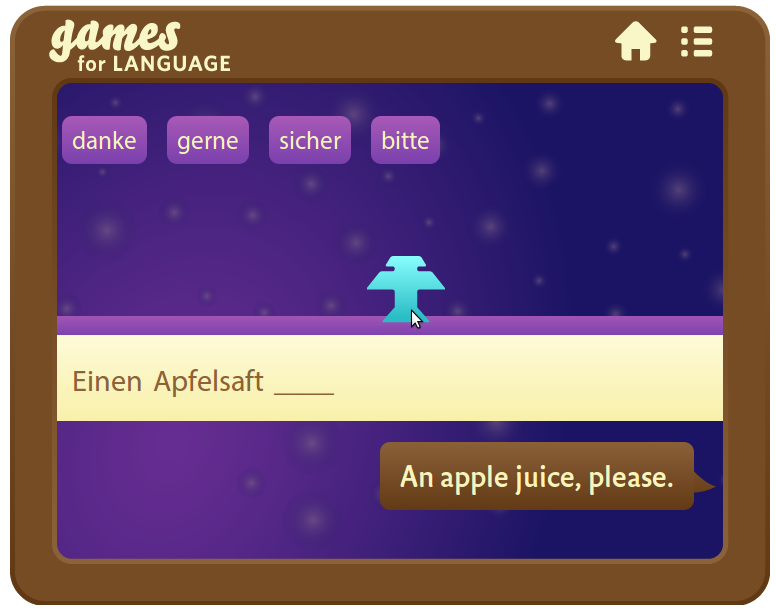Learning a Language with Games and a Travel Story
Why we chose games and a travel story for our language program is a question we are often asked. We answered this question in a recent article on Omniglot.com and are republishing it with a few edits and the revisions which have occurred since:
Our Italian Adventure
 Several years ago, my husband and I prepared for an extended stay in Italy by learning Italian with the three 30-lesson courses of Pimsleur's audio CD program.
Several years ago, my husband and I prepared for an extended stay in Italy by learning Italian with the three 30-lesson courses of Pimsleur's audio CD program.
Arriving in Italy, we could communicate well enough - although not speak fluently. However, we could read Italian only with difficulty and writing was a disaster. We kept spelling everything the French way, French being a language we both speak fluently.
Before our trip, we had also looked at other CD and DVD programs and had tried several, including Rosetta Stone. But as the vocabulary did not match our interests or needs, it was hard to stay motivated and we were quickly bored.
For example, in one of the early lessons of RS, we practiced (multiple times) all of the following sentences: the women are eating rice, the girls are reading, the horses are running, the boy is not driving.
Context Matters
Gamesforlanguage was born from of a simple idea: Learn language in a relevant context. If you can repeatedly hear, read, write, and speak the words, phrases, and sentences of a story, you'll remember them more easily, because you remember the context.
To learn a new language, you have to connect it to your own experiences. With travel being a common denominator for many language learners, we decided to create a travel story of a young man traveling to the European countries of the four languages we currently offer. (English for Spanish speakers was added later, see below.) The everyday, practical language he experiences on his trip is bound to be relevant to most travelers.
All GamesforLanguage courses are free. There are currently 36-lesson courses for French 1, German 1, Italian 1, and Spanish 1, a 72-lesson course for German 2, and a 12-lesson course for Inglés - English for Spanish speakers.
Learning with Games
But Gamesforlanguage.com is also offering something still different. Our games are not just individual learning clips, nor are they simply an addition to or an enhancement of a conventional language program. The games ARE the language program.
Each lesson of our 36 lesson course is made up of games that practice one or more of the four language skills: listening, reading, writing, and speaking.
Here are some examples:
- Memory Game: Memorize new words and phrases by hearing, reading, and saying them.
- Snap Clouds: Practice by choosing the foreign word/phrase, hearing, and saying it.
- Balloon Words: Train your ear by identifying the sounds of key words.
- Say It: Repeat words and phrases aloud after hearing them (and before seeing them briefly).
- Deal No Deal: Discover the meaning of the story dialogue by simple elimination.
- Writing Clowns: Translate and spell against time.
- Word Invaders: Build a foreign sentence by clicking on the right words. (see image)
 Other games focus on particular aspects of each language, such as pronouns, articles, adjective endings, basic conjugations, etc.
Other games focus on particular aspects of each language, such as pronouns, articles, adjective endings, basic conjugations, etc.
In addition to the courses, Quick Games and Podcastsof "The Story" can also be played for Free without registering or logging in.
A YouTube Snapshot
This brief YouTube clip, Play n' Learn with Games and a Travel Story, gives a snapshot of some of the games in the first Italian lesson.
Each lesson now begins with the story dialogue, forcing the learner to guess the meaning from the context of the story and before discovering and learning the new words and phrases.This is quite similar to what a traveler will experience when he or she tries to understand a foreign conversation.
By the time the learner hears the full story dialogue again - just before "Record It" - he or she will easily understand it, after having memorized, heard, read, spoken, and written the words and phrases of the story several times.
Grammar in Context only
In contrast to some other programs, gamesforlanguage.com teaches grammar items only as they come up in the context of the ongoing story. Grammar is not taught in the form of abstract rules.
For example: In the second lesson of our French 1 course, the following sentence is part of the dialogue: "Je suis contente que vous parliez français." We explain the use of the subjunctive form "vous parliez" (instead of the indicative "vous parlez") briefly why it is used: after a phrase expressing emotion ("je suis contente que ..."). That's all. At this stage the learner would be overwhelmed by a more detailed explanation.
Audience & Technology
Gamesforlanguage.com courses is intended primarily for "grown-ups", i.e. teenagers and adults because reading and writing is involved. However, we know that children who have just learned to read and write also enjoy the games. The online courses and Quick Games work on all modern browsers and, since January 2013, also on iOS6 iPads and iPhones.
Since Android started to support multichannel audio for HTML5, GamesforLanguage courses and Quick Games can also be played on Android devices.
